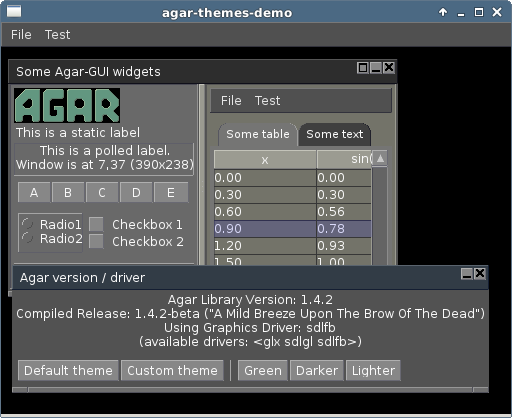SYNOPSIS
#include <agar/core.h> #include <agar/gui.h>
DESCRIPTION
 If Agar was compiled with SDL 1.x support (--with-sdl),
the "sdlfb" (frame-buffer) and "sdlgl" (single-window GL) drivers become available.
If Agar was compiled with SDL 1.x support (--with-sdl),
the "sdlfb" (frame-buffer) and "sdlgl" (single-window GL) drivers become available.
Note: For SDL 2.x series, refer to: AG_InitVideoSDL2(3).
INITIALIZATION ↑
int AG_InitVideoSDL (SDL_Surface *display, Uint flags)
int AG_SetVideoSurfaceSDL (SDL_Surface *display)
int AG_ResizeDisplay (int w, int h)
void AG_SetVideoResizeCallback (void (*fn)(Uint w, Uint h)))
The AG_InitVideoSDL() function initializes the GUI to attach to an existing SDL display surface. If the specified surface has the SDL_OPENGL flag then the GL-capable driver "sdlgl" is used. Otherwise, the direct frame-buffer driver "sdlfb" is used instead. The AG_InitVideoSDL() function accepts the following flags options:
| AG_VIDEO_HWSURFACE | Request a hardware frame buffer (SDL1 only, sets SDL_HWSURFACE). |
| AG_VIDEO_ASYNCBLIT | Enable asynchronous blitting updates (SDL1 only, sets SDL_ASYNCBLIT). |
| AG_VIDEO_ANYFORMAT | Disable emulation of surface depth (SDL1 only, sets SDL_ANYFORMAT). |
| AG_VIDEO_HWPALETTE | Exclusive palette access (SDL1 only, sets SDL_HWPALETTE). |
| AG_VIDEO_DOUBLEBUF | Enable double-buffering in frame buffer mode (SDL1 only). |
| AG_VIDEO_FULLSCREEN | Start up application in full-screen mode |
| AG_VIDEO_RESIZABLE | If a window manager is available, request that the application be resizable. This is the default with SDL2. |
| AG_VIDEO_FIXED | If a window manager is available, request that the window be non-resizable. This is the default with SDL1. |
| AG_VIDEO_BORDERLESS | If a window manager is available, disable window decorations. |
| AG_VIDEO_NOFRAME | Alias for AG_VIDEO_BORDERLESS. |
| AG_VIDEO_BGPOPUPMENU | Whenever the user right-clicks on an area not covered by an Agar window, display a standard pop-up menu with the list of active windows. |
| AG_VIDEO_OPENGL | Require OpenGL mode. If OpenGL is not available, initialization will fail. |
| AG_VIDEO_OPENGL_OR_SDL | Try OpenGL mode if available, otherwise fallback to SDL frame-buffer mode. |
| AG_VIDEO_OVERLAY | Run in OpenGL "overlay" mode. In this mode, Agar will never clear the background or swap GL buffers. Before rendering itself, Agar will also save the current OpenGL state and restore it completely once rendering is complete. Internally, this option causes the AG_DRIVER_SW_OVERLAY option to be set (see AG_DriverSw(3)). |
The AG_SetVideoSurfaceSDL() function can be used to reattach to a different (e.g., a newly resized) SDL display surface without reinitializing the GUI.
Note: The AG_InitVideoSDL() and AG_SetVideoSurfaceSDL() functions are only available if Agar has been compiled with SDL1 support (to find out at compile-time, include "<agar/config/have_sdl.h>" and test for HAVE_SDL).
Note: When creating a new SDL display (as opposed to attaching to an existing one), consider calling AG_InitGraphics(3) with the "<SDL>" argument instead of using AG_InitVideoSDL().
The AG_ResizeDisplay() function resizes the video display to the specified dimensions in pixels. AG_SetVideoResizeCallback() registers a callback function which will be invoked whenever the display is resized. Both of these functions are only applicable to single-window drivers.
SEE ALSO ↑
AG_Core(3), AG_DriverSDLFB(3), AG_DriverSDLGL(3), AG_DriverSDL2FB(3), AG_DriverSDL2GL(3), AG_DriverSDL2MW(3), AG_InitGraphics(3), AG_InitVideoSDL2(3), AG_Intro(3)
HISTORY ↑
SDL1 support first appeared in
Agar 1.0.
The "sdlfb" and "sdlgl" driver modules first appeared in
Agar 1.4.0.
SDL2 support with the "sdl2fb", "sdl2gl" and "sdl2mw" driver modules appeared in
Agar 1.7.0.

